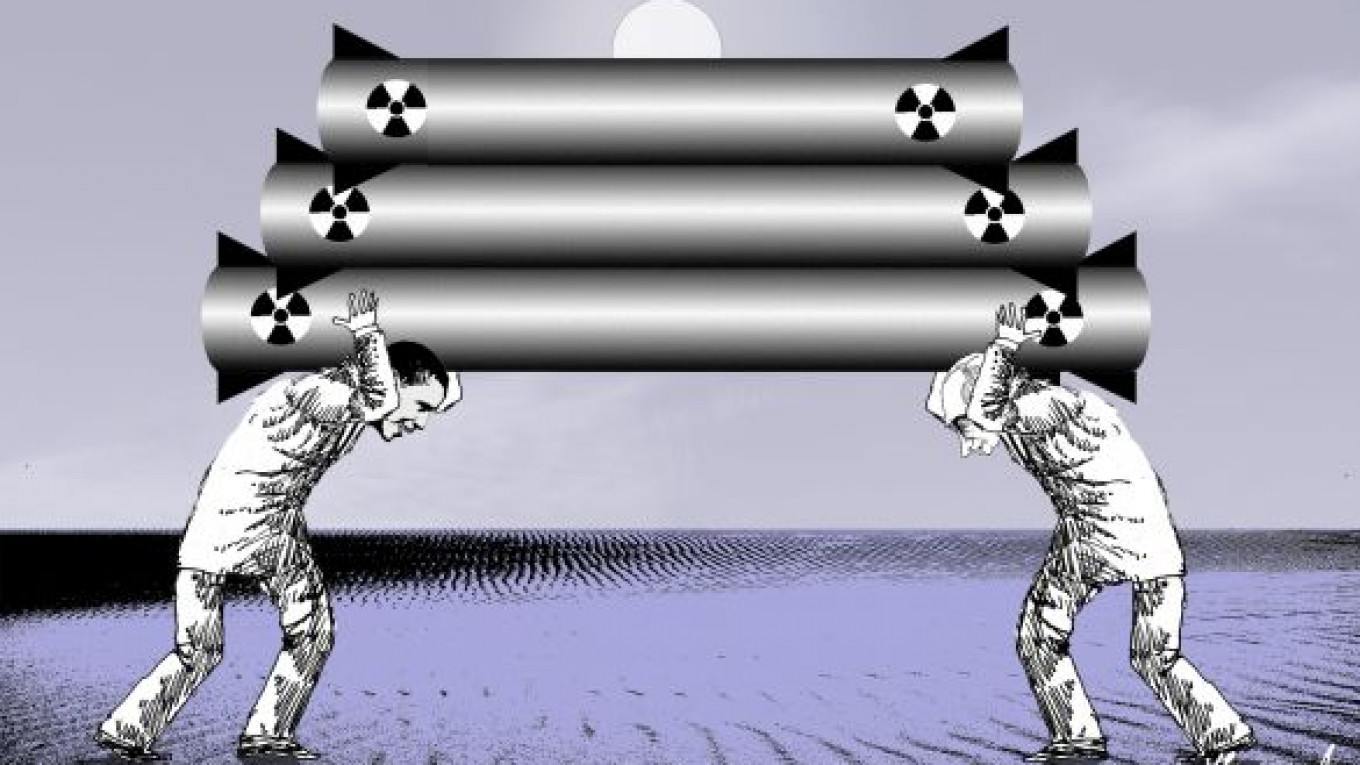In the two weeks since U.S. President Barack Obama proposed in Berlin that the U.S. and Russia each reduce their deployed strategic weapons by one-third below the levels established in the New START treaty, the Kremlin has not exactly rushed to embrace it. That is consistent with the Russian government's lack of public enthusiasm for further nuclear reductions since 2011. But Moscow's argument for holding back seems to be changing, although it still does not hold much water.
Over the past two years, Russian officials cited differences with the U.S. over missile defense as the primary reason why they were reluctant to pursue further nuclear cuts. Moscow demanded a "legal guarantee" that U.S. missile defenses would not be directed against the country's strategic missiles, something that the Kremlin knew the Senate would never approve.
The Kremlin is trying to undermine Obama's plan on further nuclear arms cuts by demanding that all global nuclear states sit down at the negotiating table.
Moreover, a huge gap exists between strategic offense and defense. New START allows the U.S. and Russia each to deploy 1,550 strategic warheads. At the most, the U.S. military in 2017 will deploy 44 interceptors capable of engaging a strategic missile warhead, while the anti-ballistic missile system around Moscow consists of 68 interceptors. A legal guarantee might be appropriate at a future point if the offense-defense gap narrows, but it is not needed now.
In March, the U.S. Defense Department canceled phase 4 of the U.S. missile defense plan for Europe. This phase envisaged a capability to intercept ICBM warheads. During the previous two years, it had drawn the loudest protests from Moscow. In April, U.S. officials proposed an agreement on transparency regarding missile defense systems. That could give Russia plenty of notice if U.S. missile defenses were on a course to grow to a point where they might challenge Russia's strategic offensive forces and give its military plenty of time to react.
Moscow has apparently found a new pretext to undermine Obama's proposal on further nuclear arms cuts. Now the Kremlin is saying the nuclear reduction process should bring in other nuclear weapons states. "Further steps that could be proposed on reducing strategic offensive weapons will have to be considered in a multilateral format," Foreign Minister Sergei Lavrov said on June 22, "because the further reductions would bring us to levels comparable to the nuclear arsenals possessed by countries other than Russia and the United States."
Like the demand for a legal guarantee on missile defense, a multilateral negotiation format for nuclear arms reductions may make sense at some future point. But not now. The U.S. and Russia together control more than 90 percent of the world's nuclear weapons. Obama's Berlin offer would hardly bring the U.S. and Russian nuclear arsenals down to levels comparable to those other countries. For example, the Federation of American Scientists estimates that the country with the third-largest nuclear arsenal, France, has about 300 total nuclear weapons, while the Chinese and British arsenals have about 250. Other nuclear weapons states, such as India, Pakistan and Israel, have even smaller arsenals. So Obama's proposal of about 1,000 or 1,100 deployed strategic warheads would still leave the U.S. and Russia as the two top dogs in nuclear weapons by a very large margin.
If you consider the large amount of nondeployed strategic and tactical nuclear weapons, the two countries have thousands of additional warheads. The Federation of American Scientists estimates that the U.S. and Russian nuclear stockpiles each number about 4,500 nuclear weapons, and that does not include retired weapons.
The U.S. and Russia should each cut their nuclear stockpiles to 2,000-2,500 warheads, both deployed and nondeployed, and reduce their deployed strategic warheads to 1,000. Those would be significant reductions but would still leave each nuclear superpower with six or seven times as many nuclear weapons as the next largest nuclear weapons state.
Russia, like the U.S., would still retain a robust nuclear deterrent that would give any country a compelling reason not to contemplate aggression. What's more, the high numbers of deployed strategic weapons, even at 1,000 warheads, would still be redundant. It is difficult to imagine the circumstances in which more than tens of nuclear weapons could reasonably be employed against an adversary. Nonetheless, if the Kremlin keeps its level of deployed warheads above 1,000, that will provide the main incentive for the U.S. to do the same.
Lavrov's demand for multilateral negotiation would be extremely difficult, even if all nuclearweapons states could be convinced to sit down at the negotiating table. While the nuclear reduction process cannot forever remain bilateral between Washington and Moscow, the two nuclear superpowers can take at least one more bilateral step before seeking to broaden participation in nuclear negotiations.
Meanwhile, the two countries can try to convince France, China and Britain to commit to not increasing their nuclear forces so long as the U.S. and Russia continue reducing theirs. Washington and Moscow could coordinate on a strategy to achieve this, including on how to use the upcoming 2015 Non-Proliferation Treaty review conference to mobilize broad support for such political steps.
Therefore, there is a logical way forward on nuclear reductions with the U.S. and Russia taking the lead roles, as they should. Further nuclear cuts should be in each side's interest because it will reduce the nuclear danger, allow cost savings, and by cutting U.S. and Russian arsenals further, it would better position those countries to urge others not to build up nuclear weapons. But pursuing such reductions will require that the Kremlin show some creativity in its thinking instead of just seeming to look for reasons not to engage.
Steven Pifer and Michael O'Hanlon are senior fellows at the Brookings Institution and co-authors of "The Opportunity: Next Steps in Reducing Nuclear Arms."
Related articles:
A Message from The Moscow Times:
Dear readers,
We are facing unprecedented challenges. Russia's Prosecutor General's Office has designated The Moscow Times as an "undesirable" organization, criminalizing our work and putting our staff at risk of prosecution. This follows our earlier unjust labeling as a "foreign agent."
These actions are direct attempts to silence independent journalism in Russia. The authorities claim our work "discredits the decisions of the Russian leadership." We see things differently: we strive to provide accurate, unbiased reporting on Russia.
We, the journalists of The Moscow Times, refuse to be silenced. But to continue our work, we need your help.
Your support, no matter how small, makes a world of difference. If you can, please support us monthly starting from just $2. It's quick to set up, and every contribution makes a significant impact.
By supporting The Moscow Times, you're defending open, independent journalism in the face of repression. Thank you for standing with us.
Remind me later.








